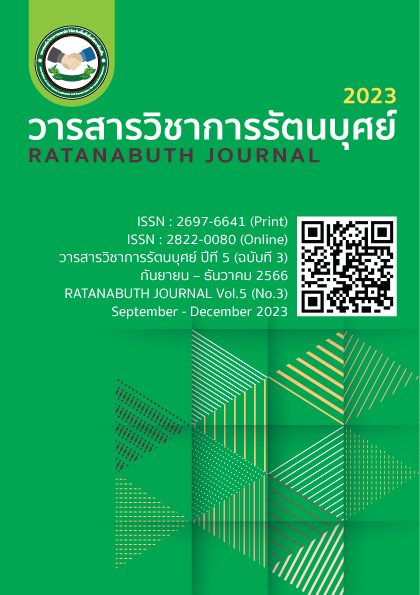The Effects of Using Phenomenon-based Learning with the R-C-A question technique in the topic of Environment in the Community on Learning Achievement and Problem-solving Ability of Prathomsuksa 3 Students The Effects of Using Phenomenon-based Learning with the R-C-A question technique in the topic of Environment in the Community on Learning Achievement and Problem-solving Ability of Prathomsuksa 3 Students
Main Article Content
Abstract
This research aimed to 1) compare the learning achievement of Prathomsuksa 3 students before and after studying the topic of ‘Environment in the Community’ using phenomenon-based learning with the R-C-A question technique, 2) compare the problem-solving abilities of Prathomsuksa 3 students before and after studying the topic of ‘Environment in the Community’ using phenomenon-based learning with the R-C-A question technique, and 3) investigate the satisfaction level of Prathomsuksa 3 students towards learning ‘Environment in the Community’ using phenomenon-based learning with the R-C-A question technique. The sample for this research comprised 12 Prathomsuksa 3 students from Ban Butawong School, Lam Plai Mat District, Buriram Province, in the Buriram Primary Education Area Office, Zone 1, who were studying in the first semester of the 2023 academic year. These students were selected through cluster random sampling. The experiment lasted 6 weeks. The statistics used for data analysis included percentages, mean, and standard deviation. The hypothesis was tested using a t-test (Dependent Samples).
The research found that 1) the learning achievement of Prathomsuksa 3 students was significantly higher after the study than before, at a .05 level of statistical significance, 2) the problem-solving abilities of Prathomsuksa 3 students were significantly higher after the study than before, at a .05 level of statistical significance, and 3) the overall satisfaction level of the Prathomsuksa 3 students was high.
Article Details

This work is licensed under a Creative Commons Attribution-NonCommercial-NoDerivatives 4.0 International License.
References
กนก จันทรา. (2562). การจัดการเรียนรู้เพื่อการรู้เรื่องภูมิศาสตร์ในวิชาสังคมศึกษา. สืบค้นเมื่อ 1 เมษายน 2565 จาก http://academic.obec.go.th/images/mission/ 1524627007_d_1.pdf.
กระทรวงศึกษาธิการ. (2565). ประกาศนโยบายจุดเน้นของกระทรวงประจำปีงบประมาณ พ.ศ.2566. สืบค้นเมื่อ 17 เมษายน 2565 จาก https://www.moe.go.th/360policy-and-focus-moe-2023/.
เกริกฤทธิ์ วังสระ. (2564). การศึกษาผลสัมฤทธิ์ทางการเรียน หน่วยการเรียนรู้เทคโนโลยีและทักษะชีวิตของนักเรียนชั้นประถมศึกษาปีที่ 5 โดยใช้การจัดการเรียนรู้แบบร่วมมือด้วยเทคนิคสืบค้นร่วมกับคำถามอาร์-ซี-เอ. วารสาร มมร วิชาการล้านนา,10(1), 58-67.
จิณห์จุฑา ศิริเวชบุรี. (2561). การพัฒนาชุดกิจกรรมการเรียนโดยประยุกต์ใช้กระบวนการเรียนรู้ปัญหาเป็นฐานเพื่อพัฒนาทักษะการแก้ปัญหา กลุ่มสาระการเรียนรู้สังคมศึกษา ศาสนาและวัฒนธรรม ชั้นประถมศึกษาปีที่ 5. วิทยานิพนธ์การศึกษามหาบัณฑิต. ชลบุรี: มหาวิทยาลัยบูรพา.
ชลาธิป สมาหิโต. (2562). การจัดประสบการณ์การเรียนรู้โดยใช้ปรากฏการณ์เป็นฐานสำหรับเด็กปฐมวัย.วารสารมหาวิทยาลัยศิลปากร, 39(1), 113-129.
ฐากร สิทธิโชค. (2564, มกราคม). แนวทางการจัดการเรียนรู้สังคมศึกษา. สืบค้นเมื่อ 1 เมษายน 2565 จากhttps://shortest .link/p3BK.
ธีระวัฒน์ เซิบรัมย์. (2565). ผลการจัดการเรียนรู้โดยใช้ปรากฏการณ์เป็นฐานร่วมกับเทคนิคคำถาม R-C-A ที่มีต่อผลสัมฤทธิ์ทางการเรียนวิทยาศาสตร์และความสามารถในการแก้ปัญหาทางวิทยาศาสตร์ของนักเรียนชั้นประถมศึกษาปีที่ 5 โรงเรียนชุมชนไมตรีอุทิศ จังหวัดนนทบุรี. วารสารวิจัยและพัฒนามหาวิทยาลัยราชภัฏสวนสุนันทา, 13(1), 82-96.
พิพัฒน์พงษ์ ดำมาก. (2565). การศึกษาผลการจัดการเรียนรู้รายวิชาสังคมศึกษาโดยใช้ปรากฏการณ์เป็นฐาน เพื่อพัฒนาทักษะการคิดวิเคราะห์และผลสัมฤทธิ์ทางการเรียน. วารสารเทคโนโลยีและสื่อสารการศึกษา. 15(5), 36-46.
มารุต พัฒผล. (2566, 8 พฤษภาคม). ทฤษฎีการเรียนรู้กลุ่มการรู้คิด. สืบค้นเมื่อ 19 เมษายน 2565 จาก www.curriculumandlearning.com/upload/ModuleCognitiveCoaching/Module%204%20Cognitive%20Ccoaching_1608431604.pdf.
ยุพิน พลเรือง. (2565). การพัฒนารูปแบบการจัดการเรียนรู้แบบปรากฏการณ์เป็นฐานบูรณาการอภิปัญญาและความรู้ในเนื้อหาผนวกวิธีสอนและ เทคโนโลยีเพื่อพัฒนาทักษะการเรียนรู้ในศตวรรษที่ 21 วิชาคณิตศาสตร์ ของนักเรียนชั้นมัธยมศึกษาปีที่ 6. วารสารศึกษาศาสตร์มหาวิทยาลัยมหาสารคาม,16(2), 137-147.
โรงเรียนบ้านบุตาวงษ์. (2565). รายงานผลการพัฒนาคุณภาพการศึกษา (Self-Assessment Report : SAR) ประจำปีการศึกษา 2565. บุรีรัมย์ : โรงเรียนบ้านบุตาวงษ์.
วริศรา เมืองจันทร์. (2564). การจัดกิจกรรมการเรียนรู้โดยใช้ปรากฏการณ์เป็นฐานเพื่อพัฒนาทักษะการเชื่อมโยงทางคณิตศาสตร์ของนักเรียนชั้นประถมศึกษาปีที่ 5 เรื่องรูปเรขาคณิต. วารสารบัณฑิตศึกษา มหาวิทยาลัยราชภัฏวไลยอลงกรณ์ ในพระบรมราชูปถัมภ์, 15(2), 143-155.
วิภาพรรณ พินลา. (2559). แนวทางการจัดการเรียนรู้สังคมศึกษา โดยใช้กระบวน การคิดแก้ปัญหาสำหรับผู้เรียนยุคศตวรรษที่ 21. วารสารศึกษาศาสตร์มหาวิทยาลัยมหาสารคาม, 10(3), 21-31.
วิภาพรรณ พินลา และวิภาดา พินลา. (2565). การเรียนรู้โดยใช้ปรากฏการณ์เป็นฐานที่เชื่อมโยงการบูรณาการข้ามศาสตร์ในห้องเรียนของครูสังคมศึกษา. วารสารศึกษาศาสตร์ มหาวิทยาลัยทักษิณ, 22(2), 1-13.
วีระพงษ์ พิมพ์สาร.(2562).การศึกษาไทยกับการประยุกต์ใช้ Phenomenon Based Learning. นิตยสารสถาบันส่งเสริมการสอนวิทยาศาสตร์และเทคโนโลยี. 47(220), 46-50.
สำนักงานรับรองมาตรฐานและประเมินคุณภาพการศึกษา (องค์การมหาชน). (2565). รายงานการประกันคุณภาพภายนอก : ผลการประเมิน SAR ภายใต้สถานการณ์ COVID – 19 การศึกษาปฐมวัยและระดับการศึกษาขั้นพื้นฐาน. กรุงเทพฯ: สำนักงานรับรองมาตรฐานและประเมินคุณภาพการศึกษา (องค์การมหาชน).
สำนักงานเลขาธิการสภาการศึกษา. (2560). แผนการศึกษาแห่งชาติ พ.ศ. 2560-2579. กรุงเทพฯ: บริษัท พริกหวานกราฟฟิค จำกัด.
สำนักวิชาการและมาตรฐานการศึกษา. (2562). รายงานการอบรมหลักสูตรการจัดการเรียนการสอนวิทยาศาสตร์สำหรับผู้มีความสามารถพิเศษทางด้านวิทยาศาสตร์และคณิตศาสตร์. กรุงเทพฯ: กลุ่มพัฒนาการศึกษาสำหรับผู้มีความสามารถพิเศษ สำนักวิชาการและมาตรฐานการศึกษา.
Daehler, K. & Folsom, J. (2016). Making Sense of SCIENCE: Phenomena-Based Learning. Retrieved from http://www.WestEd.org/mss.
Dirver, R. & Bell, B. (1986). Students’ Thinking and the Learning of Science: A Constructivist View. School Science Review, 67(240), 443-456.
Fields, D. (2019). Phenomenon Based Learning (Paper presented at the 2019 Oxford National Conference in Italy. Retrieved From https://elt.oup.com/feature/it/ONC19/? cc=de&selLanguage=de& mode=hub.
Heikkila, E. (2022). Sustainability through a Phenomenon Based Learning Approach a Study of Student Reflections. Master’s Thesis. Helsinki: University of Helsinki.
Silander, P. (2015). How to Create the School of the Future-Revolutionary Thinking and Design from Finland. Finland: Multprint.
Stolberg, R.J. (1986). Teaching Critical Thinking, Part 1: Are We Making Critical Mistakes? Phi Delta Kappan, 67(3), 194-197.
Symeonidis, V., & Schwarz, J. F. (2016). Phenomenon-Based Teaching and Learning through the Pedagogical Lenses of Phenomenology: The Recent Curriculum Reform in Finland. Forum Oswiatowe, 28(2), 31-47.
Tissington, S. (2019). Learning with and through Phenomena: An Explainer on Phenomenon-based Learning. Paper presented at the Association of Learning Developers in Higher Education Northern Symposium. Middlesbrough UK: Teesside University.
Wakill et al. (2019). Phenomenon-based Learning for Teaching ICT Subject through other Subjects in Primary Schools. Journal of Computer and Education Research, 7(13), 209-210.
Weir, J. J. (1974). Problem Solving is Every Body’s Problem. Science Teacher, 41(4), 16-18.


